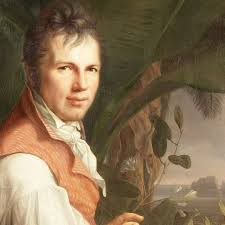Algis Valiunas at The New Atlantis:
 The presiding scientific genius of the Romantic age, when science had not yet been dispersed into specialties that rarely connect with one another, Alexander von Humboldt wanted to know everything, and came closer than any of his contemporaries to doing so. Except for Aristotle, no scientist before or since this German polymath can boast an intellect as universal in reach as his and as influential for the salient work of his time. His neglect today is unfortunate but instructive.
The presiding scientific genius of the Romantic age, when science had not yet been dispersed into specialties that rarely connect with one another, Alexander von Humboldt wanted to know everything, and came closer than any of his contemporaries to doing so. Except for Aristotle, no scientist before or since this German polymath can boast an intellect as universal in reach as his and as influential for the salient work of his time. His neglect today is unfortunate but instructive.
Humboldt (1769–1859) undertook to disseminate the knowledge he acquired as rapidly and widely as possible, and initiated a network of correspondents among the world’s principal scientific specialists. Thus, Humboldt’s prodigious achievement ironically made it impossible for his scientific descendants to have a career so wondrously varied as his. Taking the entirety of nature and culture as his province, through the gathering and arrangement of all the particulars that one extraordinary mind could hold, he sought “a scheme comprehending the whole material creation” — “perhaps too bold a plan.” So he declared in his 1845 summa, Cosmos: Sketch of a Physical Description of the Universe.
more here.
